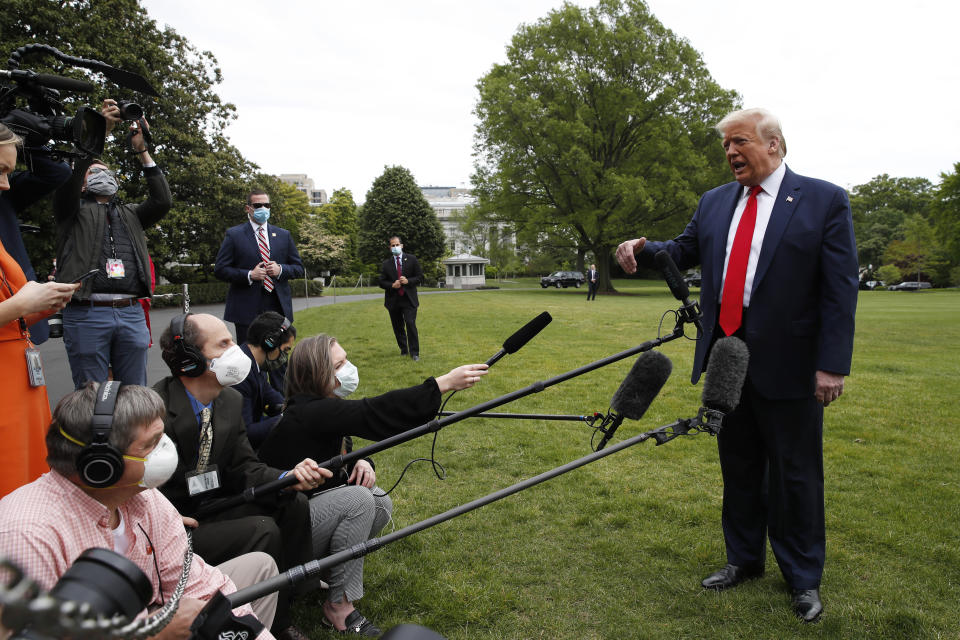The 'fatal flaw' in Trump’s reelection campaign
President Trump enjoys unwavering support from his “base,” the loyalists who account for perhaps 30% of the electorate. But that’s not enough to win reelection, and Trump seems to be losing rather than gaining the coalition of others needed to put him over the top in November.
“His fatal flaw as a political thinker is that he has played only to his base,” political scholar Elaine Kamarck of the Brookings Institution says on the latest episode of the Yahoo Finance Electionomics podcast. “He has to expand his base and he's never shown an inclination to do so, which is different than every other president we have known in the modern era.”
The Trump base consists largely of white working-class Republicans, more men than women, who favor strict limits on immigration and Trump’s “America first” agenda. They don’t mind his fights with the press or his attacks on critics, and might even applaud his combative style. Trump’s approval rating, around 44%, includes the base plus others who think Trump is doing a good job, even though they could be persuaded to vote for somebody else. When Trump won 46% of the popular vote in 2016, some Trump voters were signaling dislike of Trump’s opponent, Hillary Clinton, more than loyalty to Trump.
Trump’s 2020 opponent, Joe Biden, is more popular than Clinton was, which means there will be less of an anti-Biden vote in 2020 than the anti-Clinton vote in 2016. Trump hoped to win over voters outside of his base by running on a strong economy, but that plan has obviously fizzled amid the coronavirus recession, with the unemployment rate approaching 20%. What does that leave Trump to run on?
Two approaches for reelection
Kamarck sees two strategies emerging in the Trump campaign. The first is to highlight Trump’s handling of the coronavirus, despite widespread criticism of his dismissiveness early on and his continued reluctance to mount a strong federal response. The latest evidence of this is Trump’s errant claim that the United States leads the world in coronavirus testing, even though it lags behind several countries when adjusted for population.

The other prong is Trump’s vilification of China, to deflect from Trump’s own handling of the virus and create a bogeyman. The virus originated in China and there’s convincing evidence China covered up the extent of the outbreak early on. But this is unlikely to resonate much beyond Trump’s base, especially if the economy is still reeling by Election Day and Americans are alarmed about their financial prospects.
[Check out other episodes of the Electionomics podcast.]
The problem with this approach is while it might energize his base, it drives away moderates of both parties and Independents Trump needs to win. Trump already seems to be slipping with two crucial groups: voters over 65 and white working-class women. Older Americans are more vulnerable to coronavirus and therefore more likely to hold Trump accountable if they feel his response has been ineffective. Blue-collar women may be getting turned off by Trump’s attacks on female opponents, including some new members of Congress.
Biden leads Trump by about 5 points in national polls, and he also leads in most swing states that will likely determine the winner in November. Democrats remain nervous, nonetheless, fearful that Biden will trip himself up or wither as Trump begins to attack him forcefully. Kamarck thinks Biden’s lead is solid. “Elections are always about incumbents,” she says. “Incumbents can try to make the election about the challenger. But in this kind of situation, with the incumbent in the middle of a huge national catastrophe, it's hard to imagine that the Republicans are going to be able to make this election about Joe Biden.”
Republicans are so concerned about prospects for the party that some members of the House and Senate up for reelection are distancing themselves from Trump, hoping voters won’t connect them with the head of their party. In a leaked memo, the National Republican Senatorial Committee advises candidates, “don’t defend Trump” on the coronavirus. Instead, “attack China.” And a group of prominent Republicans has formed the Lincoln Project, which is running ads pounding Trump’s performance amid the coronavirus crisis.
In Trump’s corner, that leaves the base plus an assortment of voters who applaud his handling of the coronavirus crisis, think he’s still better for the economy than Biden or favor his evangelical tilt. The worse the crisis gets, the thinner that group becomes.
Rick Newman is the author of four books, including “Rebounders: How Winners Pivot from Setback to Success.” Follow him on Twitter: @rickjnewman. Confidential tip line: rickjnewman@yahoo.com. Encrypted communication available. Click here to get Rick’s stories by email.
Read more:
Get the latest financial and business news from Yahoo Finance
Follow Yahoo Finance on Twitter, Facebook, Instagram, Flipboard, SmartNews, LinkedIn, YouTube, and reddit.

